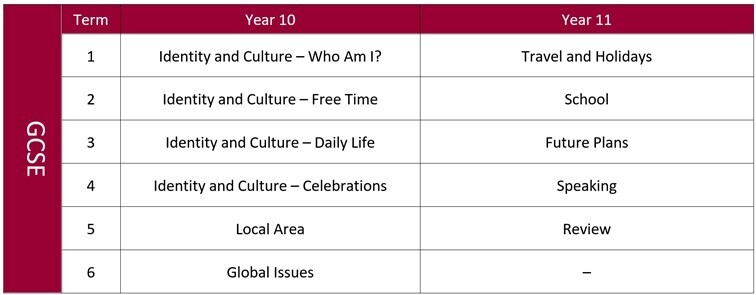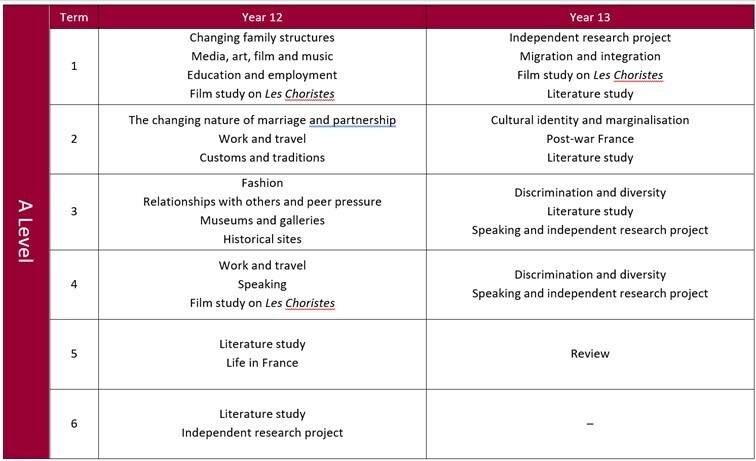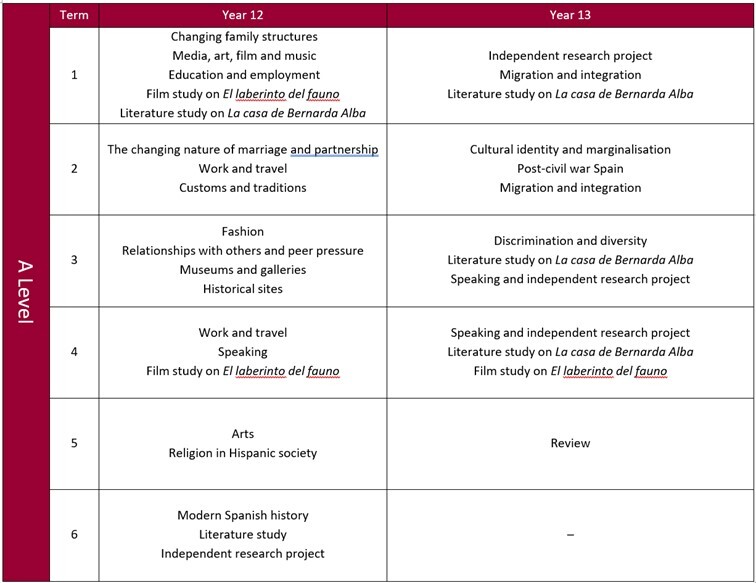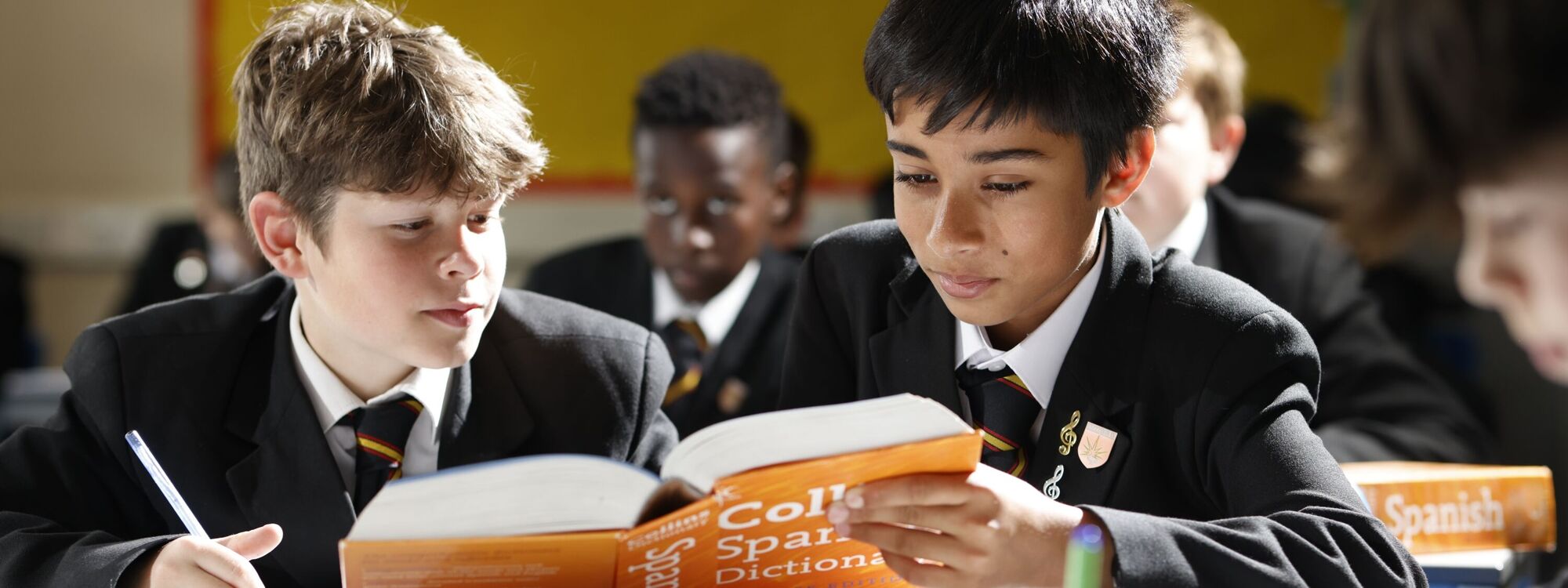- Home
- Curriculum and Exams
- Subjects
- Modern Foreign Languages
Modern Foreign Languages
BackHead of Department: Miss N Allen
French Curriculum Lead: Mrs P Gray
Spanish Curriculum Lead: Ms C Blenkin
KS5 French and Spanish Lead: Ms S Wilkey
Teachers: Mrs M Di Santo, Miss H Long, Mrs J Mason, Miss M Persée, Miss E Rodriguez
MFL Assistant: Mrs L Bainbridge
Students learn French and Spanish. As well as developing linguistic skills and knowledge, we as a department strive to foster and encourage a lasting enjoyment and appreciation of Modern Foreign Languages and their associated culture and traditions. We believe in developing oral and written fluency, supported by careful study and practice of grammar and vocabulary. We aim to develop the skills of listening, reading, speaking and writing through a wide range of activities including: class oral work, pair work, group work, acting out dialogues, vocabulary learning, oral and written grammar drills, listening to and watching recorded material, songs, playing language games, dictation, using interactive computer resources, reading comprehension, translation work and writing compositions. [Updated 2023/24]
Co-curricular activities
We offer French and Spanish language clubs (including Lego Language Club) and theatre experiences. In recent years, our trips have included a KS3 day trip to France and a longer Year 10 trip to France participating in a range of cultural activities. Year 10s have also had the opportunity to take part in a trip to Madrid.
Years 7, 8 and 9
French

Spanish

Year 7
Main grammatical concepts: articles; gender; nouns; regular and some irregular verbs in the present tense; negation; adjectives; prepositions.
Year 8
Main grammatical concepts: revision of grammar normally covered in Year 7; additional irregular verbs, reflexive verbs and modal verbs in the present tense; more extensive use of adjectives; object pronouns; introduction to the near future tense.
Year 9
Main grammatical concepts: revision of present tense and consolidation of grammar covered in Year 8; adjectives; personal pronouns; negatives; past and future tenses.
GCSE: Years 10 and 11
A GCSE course in Modern Languages allows you to develop your ability to understand the spoken and written language and express yourself both orally and in writing. Your skills will be developed through a variety of activities, including giving presentations, group work, independent research, pair work, the use of ICT and the chance to work in small groups with our Foreign Language Assistants.
GCSE MFL course outline
At the end of Year 9, students must continue their study of at least one modern foreign language but may also opt to study two. Having qualifications in two foreign languages can be a real asset in today’s globalised work market and will look impressive on a curriculum vita when applying for university and jobs.
It is school policy to enter all pupils for the GCSE language examination. The Department follows the Edexcel syllabus for French and Spanish. It is school practice to enable bilingual students to take the GCSE in their mother tongue. It is not always possible to cater for the speaking tests on the school site and in some cases a different examination board is used.
Why study a foreign language?
A foreign language at GCSE shows a real breadth of knowledge and develops skills of communication and critical thinking, which are readily transferable and highly sought-after in further education and employment. Students will develop a wide set of skills, including, but not limited to: presenting written and spoken ideas, communicating, developing, justifying points of view.
What further courses and careers can this lead to?
After completing a GCSE in Languages, you can continue to study it at A Level, where students learn more about countries that speak the language – about culture, history, art and literature. As well as traditional language-based careers such as interpreting, translating and teaching, languages open up careers in international companies or anywhere in the world… Airbus Group, Médecins sans Frontières, Renault, Electricité de France (EDF), Zara, SEAT, Banco Santander, L’Oréal…
What topics are studied?
Questions across all four language skills are set in common contexts, addressing a range of relevant contemporary and cultural themes and organised into themes, topics and sub-topics as listed below.
French

Spanish

Examination/assessment
There are exams in all four skill areas of Listening, Speaking, Reading and Writing at the end of the course in Year 11. There is no coursework or controlled assessment element, although students will naturally be thoroughly prepared for the real thing!
Paper 1: Listening – Understanding and responding to different types of spoken language (25%). Questions are answered in both English and the target language.
Paper 2: Speaking – Communicating and interacting effectively in speech for a variety of purposes (25%).
Paper 3: Reading – Understanding and responding to different types of written language (25%). Questions are answered in both English and the target language.
Paper 4: Writing – Communicating effectively in writing for a variety of purposes (25%).
Exam board: Edexcel
French A Level: Years 12 and 13

Entry requirement: A GCSE grade 6 in French
The WJEC Eduqas A Level in French provides an engaging and exciting opportunity for students to build on their previous study of French. Through social, intellectual, historical and political cultural themes students will be able to develop their linguistic knowledge and cultural understanding of the countries/communities where the language is spoken. An opportunity to study literature and film will allow students to undertake a deeper analysis of language structures and increase their cultural awareness as part of an integrated approach to language learning. A strong focus is placed on building students' confidence and fluency in spoken French using relevant and topical themes. The requirement to research an area of personal interest related to the country/communities where French is spoken will enhance students' cultural appreciation and enable them to gain a greater awareness of intercultural differences.
A Level examination
Component 1: Speaking: 30%
Component 2: Listening, reading and translation: 50%
Component 3: Critical and analytical response in writing: 20%
Exam board: Eduqas
Spanish A Level: Years 12 and 13

The WJEC Eduqas A Level in Spanish provides an engaging and exciting opportunity for students to build on their previous study of Spanish. Through social, intellectual, historical and political cultural themes students will be able to develop their linguistic knowledge and cultural understanding of the countries/communities where the language is spoken. An opportunity to study literature and film will allow students to undertake a deeper analysis of language structures and increase their cultural awareness as part of an integrated approach to language learning. A strong focus is placed on building students' confidence and fluency in spoken Spanish using relevant and topical themes. The requirement to research an area of personal interest related to the country/communities where Spanish is spoken will enhance students' cultural appreciation and enable them to gain a greater awareness of intercultural differences.
A Level examination
Component 1: Speaking: 30%
Component 2: Listening, reading and translation: 50%
Component 3: Critical and analytical response in writing: 20%
Exam board: Eduqas
Careers Education
The MFL Department has a successful track record of students who have proceeded to study Modern Languages at university.
The Department offers advice to students applying to study Modern Languages in Higher Education.
We offer advice to students considering doing a university degree in Modern Languages or following associated career paths.
We inform Sixth Formers about the Language Show which takes place annually in London in October which they can attend. The Careers Zone at Language Show Live is the place for skilled linguists to meet recruiters, get advice, hear from experts and find a job. There is a Careers Forum where they can find dedicated sessions on how to make best use of their language skills and the opportunities available within the language world. There is a CV Clinic which offers practical CV guidance and free careers advice for jobseekers and language professionals. They can also meet potential employers face-to-face.
Some teachers in the department have also had successful careers in other areas of the world of work and they are able to demonstrate that the academic rigour of an MFL degree course equips students well for the competitive job market, making them attractive to employers and opening up a variety of professional opportunities.
We inform Sixth Form students about work experience opportunities in France and Spain.
